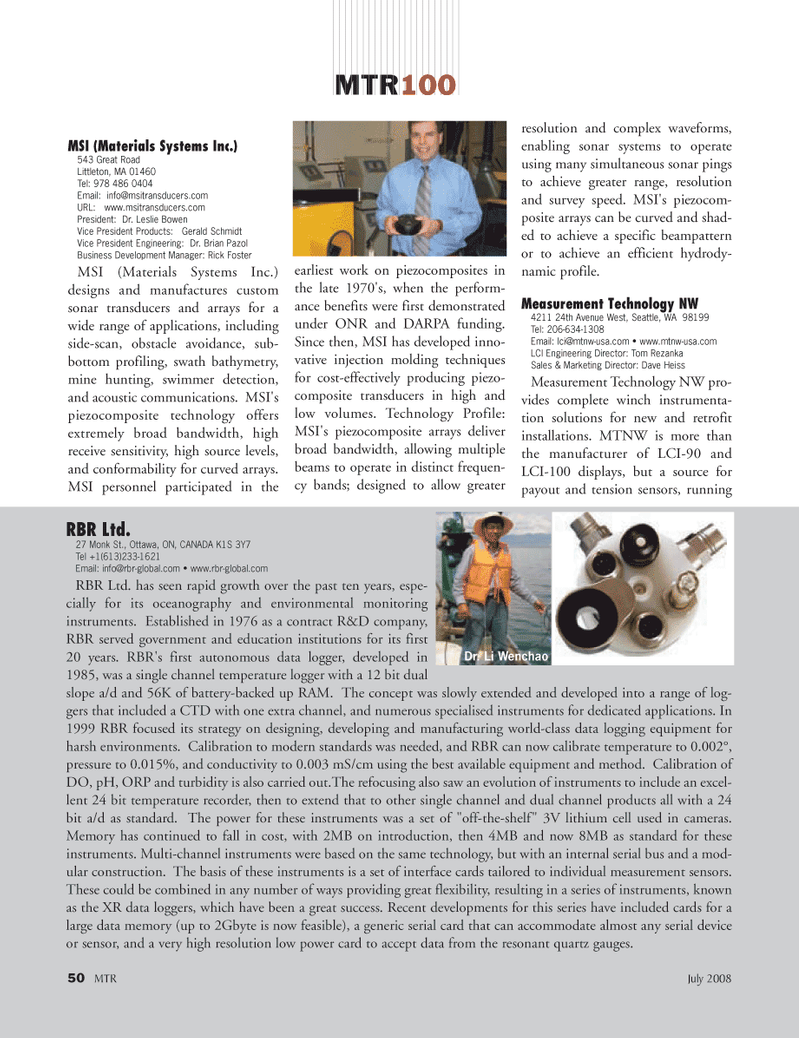
Page 50: of Marine Technology Magazine (July 2008)
The MTR 100 Yearbook
Read this page in Pdf, Flash or Html5 edition of July 2008 Marine Technology Magazine
50 MTR July 2008
MSI (Materials Systems Inc.) 543 Great Road
Littleton, MA 01460
Tel: 978 486 0404
Email: [email protected]
URL: www.msitransducers.com
President: Dr. Leslie Bowen
Vice President Products: Gerald Schmidt
Vice President Engineering: Dr. Brian Pazol
Business Development Manager: Rick Foster
MSI (Materials Systems Inc.) designs and manufactures custom sonar transducers and arrays for a wide range of applications, including side-scan, obstacle avoidance, sub- bottom profiling, swath bathymetry, mine hunting, swimmer detection, and acoustic communications. MSI's piezocomposite technology offers extremely broad bandwidth, high receive sensitivity, high source levels, and conformability for curved arrays.
MSI personnel participated in the earliest work on piezocomposites in the late 1970's, when the perform- ance benefits were first demonstrated under ONR and DARPA funding.
Since then, MSI has developed inno- vative injection molding techniques for cost-effectively producing piezo- composite transducers in high and low volumes. Technology Profile:
MSI's piezocomposite arrays deliver broad bandwidth, allowing multiple beams to operate in distinct frequen- cy bands; designed to allow greater resolution and complex waveforms, enabling sonar systems to operate using many simultaneous sonar pings to achieve greater range, resolution and survey speed. MSI's piezocom- posite arrays can be curved and shad- ed to achieve a specific beampattern or to achieve an efficient hydrody- namic profile.
Measurement Technology NW 4211 24th Avenue West, Seattle, WA 98199
Tel: 206-634-1308
Email: [email protected] • www.mtnw-usa.com
LCI Engineering Director: Tom Rezanka
Sales & Marketing Director: Dave Heiss
Measurement Technology NW pro- vides complete winch instrumenta- tion solutions for new and retrofit installations. MTNW is more than the manufacturer of LCI-90 and
LCI-100 displays, but a source for payout and tension sensors, running
MTR100
RBR Ltd. 27 Monk St., Ottawa, ON, CANADA K1S 3Y7
Tel +1(613)233-1621
Email: [email protected] www.rbr-global.com
RBR Ltd. has seen rapid growth over the past ten years, espe- cially for its oceanography and environmental monitoring instruments. Established in 1976 as a contract R&D company,
RBR served government and education institutions for its first 20 years. RBR's first autonomous data logger, developed in 1985, was a single channel temperature logger with a 12 bit dual slope a/d and 56K of battery-backed up RAM. The concept was slowly extended and developed into a range of log- gers that included a CTD with one extra channel, and numerous specialised instruments for dedicated applications. In 1999 RBR focused its strategy on designing, developing and manufacturing world-class data logging equipment for harsh environments. Calibration to modern standards was needed, and RBR can now calibrate temperature to 0.002°, pressure to 0.015%, and conductivity to 0.003 mS/cm using the best available equipment and method. Calibration of
DO, pH, ORP and turbidity is also carried out.The refocusing also saw an evolution of instruments to include an excel- lent 24 bit temperature recorder, then to extend that to other single channel and dual channel products all with a 24 bit a/d as standard. The power for these instruments was a set of "off-the-shelf" 3V lithium cell used in cameras.
Memory has continued to fall in cost, with 2MB on introduction, then 4MB and now 8MB as standard for these instruments. Multi-channel instruments were based on the same technology, but with an internal serial bus and a mod- ular construction. The basis of these instruments is a set of interface cards tailored to individual measurement sensors.
These could be combined in any number of ways providing great flexibility, resulting in a series of instruments, known as the XR data loggers, which have been a great success. Recent developments for this series have included cards for a large data memory (up to 2Gbyte is now feasible), a generic serial card that can accommodate almost any serial device or sensor, and a very high resolution low power card to accept data from the resonant quartz gauges.
Dr. Li Wenchao
MTR#6 (49-64).qxd 7/18/2008 9:02 AM Page 50

 49
49

 51
51
